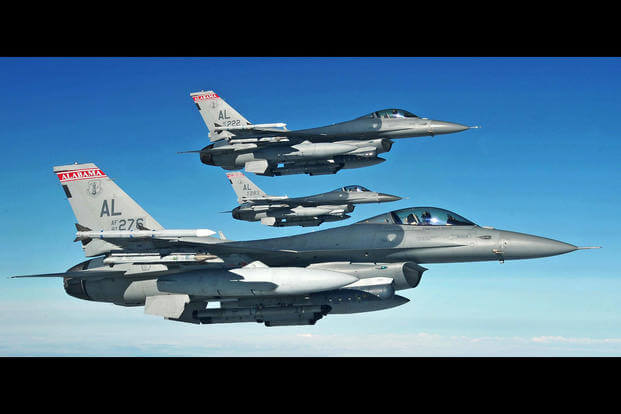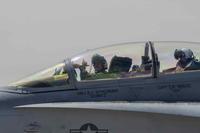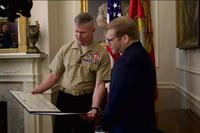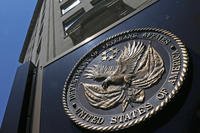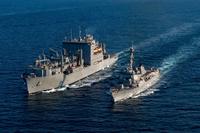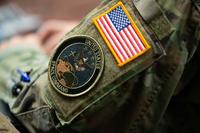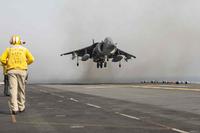TUCSON INTERNATIONAL AIRPORT, Ariz. -- For more than 65 years the Air Force has embraced the concept of flexibility being the key to airpower. Now Airmen from the Arizona Air National Guard are sharing that capacity to find creative ways to overcome problems with one of the Air Force's newest allies - the Iraqi air force.
The Iraqi government purchased 36 F-16 Fighting Falcons to help rebuild their air force; however the security situation in Iraq made delivering the aircraft impractical. The decision was made to instead deliver a portion of the jets to Tucson, Arizona and continue the IAF pilots' training there. The Arizona ANG's 162nd Wing was chosen to provide the training due to its already established experience with foreign students.
"Here at the 162nd Wing we have a lot of missions," said Lt. Col. Julian Pacheco, the 152nd Fighter Squadron director of operations and a F-16 instructor pilot. "But we're mostly known for our international training of F-16 pilots."
The wing, based at Tucson International Airport, is home to pilots in training from many nations, including the Netherlands, Norway, Singapore, Japan, and most recently Iraq. While working with airmen from foreign nations can present challenges, it's nothing new to the men and women of the 162nd.
"As with any new country there are certainly challenges, mostly communication -- learning their culture and how they learn new things," Pacheco said. "(But) it's basically training a pilot to fly a different aircraft. All the Iraqi pilots have gone through U.S. pilot training and then move to Arizona for their F-16 training."
Of the 36 aircraft on order, U.S. and Iraqi Airmen made history Dec. 16, as they delivered the first two Iraqi air force F-16D aircraft to Tucson. The most advanced Iraqi student in Tucson, captain Hama, celebrated the arrival of the aircraft with his fellow students.
"It's a nice feeling to finally have them here," Hama said. "They're not home yet, but we're going to start flying them and get them ready. Soon enough we'll be home flying them over Iraq."
Hama knew from an early age he would follow his father into military service, but his desire to fly led him in a slightly different direction.
"I've had a passion for flying since I was a kid," he said. "I started with the army, but I just wanted to be a pilot. I had the chance to join the air force and become a pilot so I did it."
All of the Iraqi pilots in the training pipeline are eager to complete their training and return home to defend their country.
"The arrival of Iraqi purchased and owned F-16s is a tremendous step towards Iraqi air force pilots providing organic air power for their country," said Maj. Gen. Lawrence Martin, the assistant deputy under secretary of the U.S. Air Force for international affairs.
"They are one of many countries joining a partnering coalition in the fight against ISIS and this delivery will greatly add to their capability in this ongoing fight," he said. "This type of partner aircrew training is mutually beneficial for students and instructors and promotes safe, integrated operations in a cost-effective environment."
Additionally, Pacheco said it is the instructors' goal that when that day comes, the newly minted fighter pilots are as ready as they can be.
"It's very important to get these pilots trained up in the F-16 as best we can," Pacheco said. "Once they're done with their training here in Tucson they'll go home and go right into operations. Every lesson we can impart to the students, is critical because they'll be using those skills as soon as they go home.
"With this new fleet of aircraft and the skills that we're teaching them here, they'll be able to protect themselves from threats, and hopefully bring peace to Iraq."
While the pilots may want to go home to defend their homeland right away, there is still training to be completed here, and the instructors want to ensure they are giving Iraq the best fighter pilots they possibly can.
"(The situation in Iraq) doesn't lend itself to training," Pacheco said. "The air bases are not ready to accept the aircraft. Bringing the aircraft here lets the pilots get used to their new airplanes in a good training environment. They can concentrate on how to fly this new aircraft and use its systems. When we can deliver the aircraft in country, they'll be ready to go."
Hama especially is excited to be flying over his native country and has high hopes for the future of Iraq.
"I'm ready to fly them today, we're just waiting for the green light," he said. "We're ready, anytime they want us to go. I just want to see my country like any other country, safe and the people living a nice life without the threat of being bombed or kidnapped by bad people."
The two jets delivered were the first of eight that will be flown to the Arizona air base to allow Iraqi pilots to fly and train in their own aircraft. Six more F-16s are scheduled to be delivered over the next five months.
